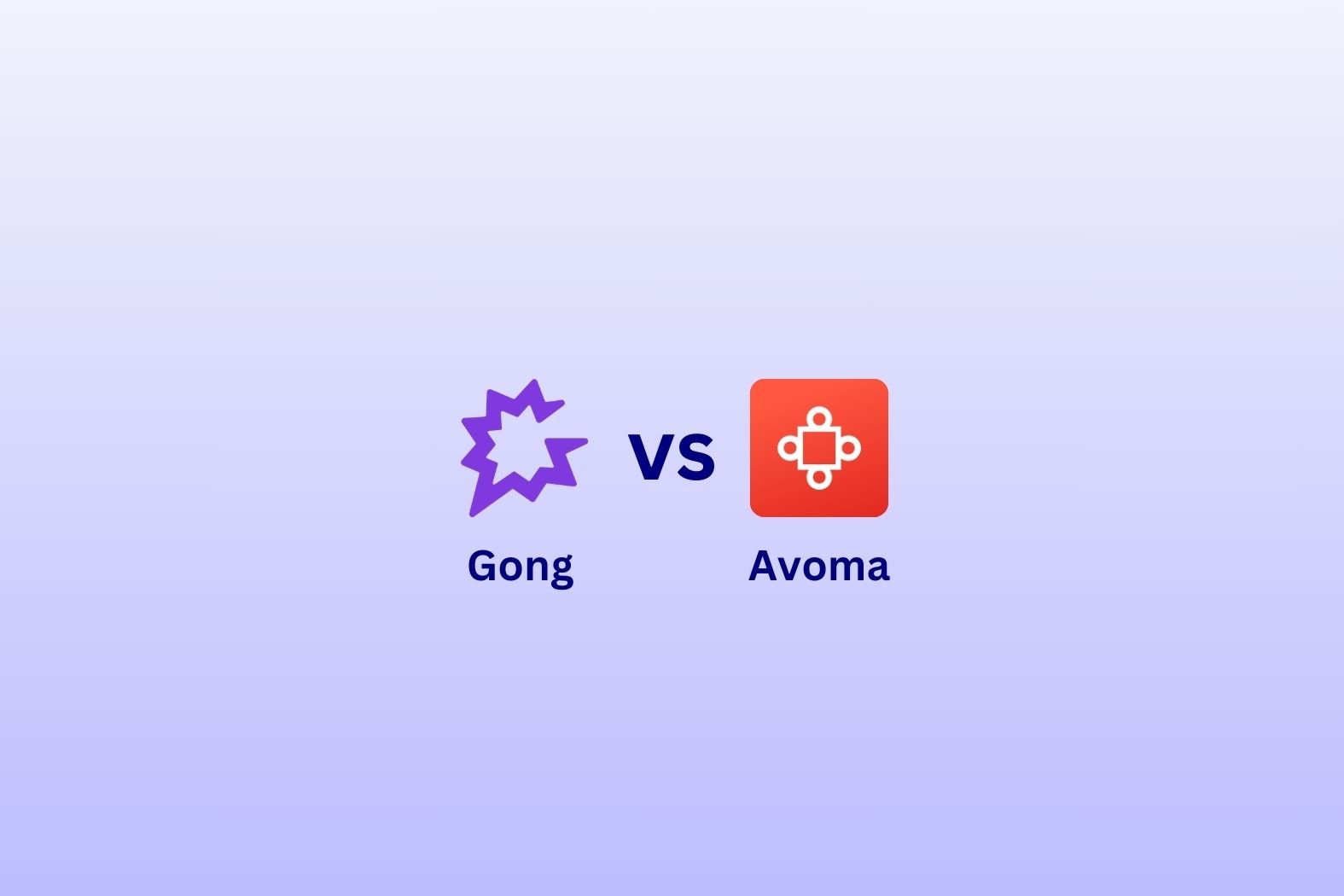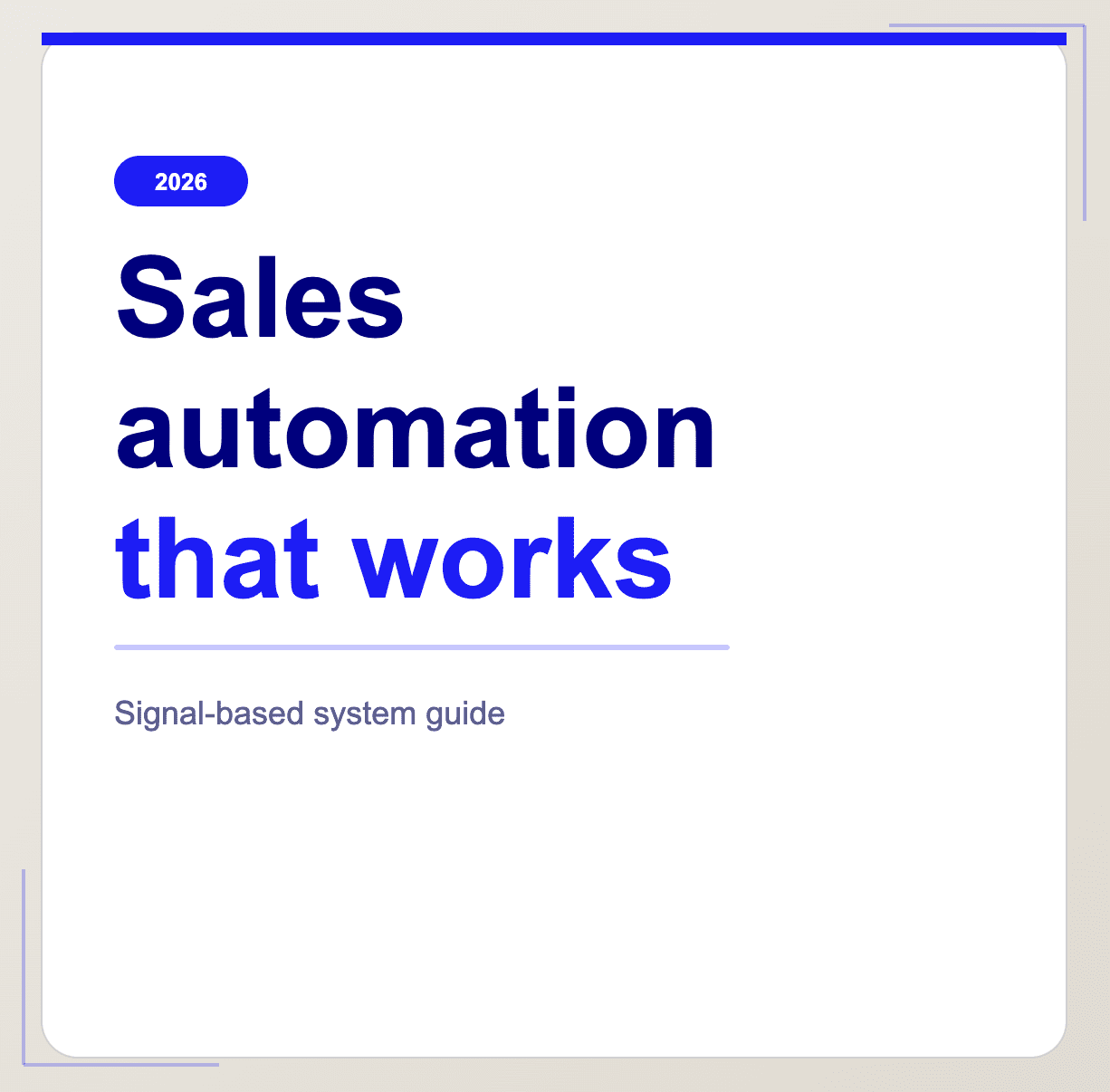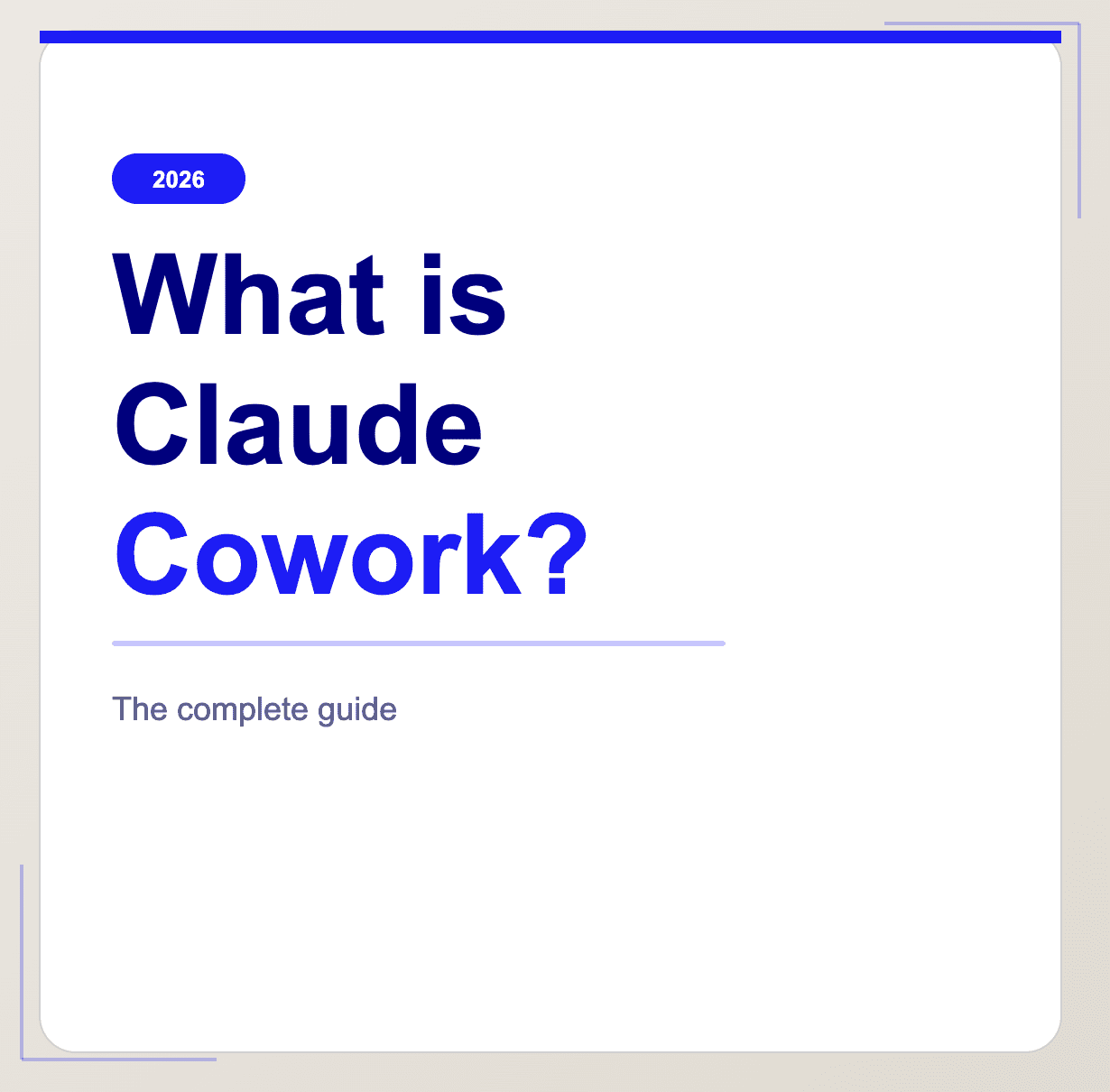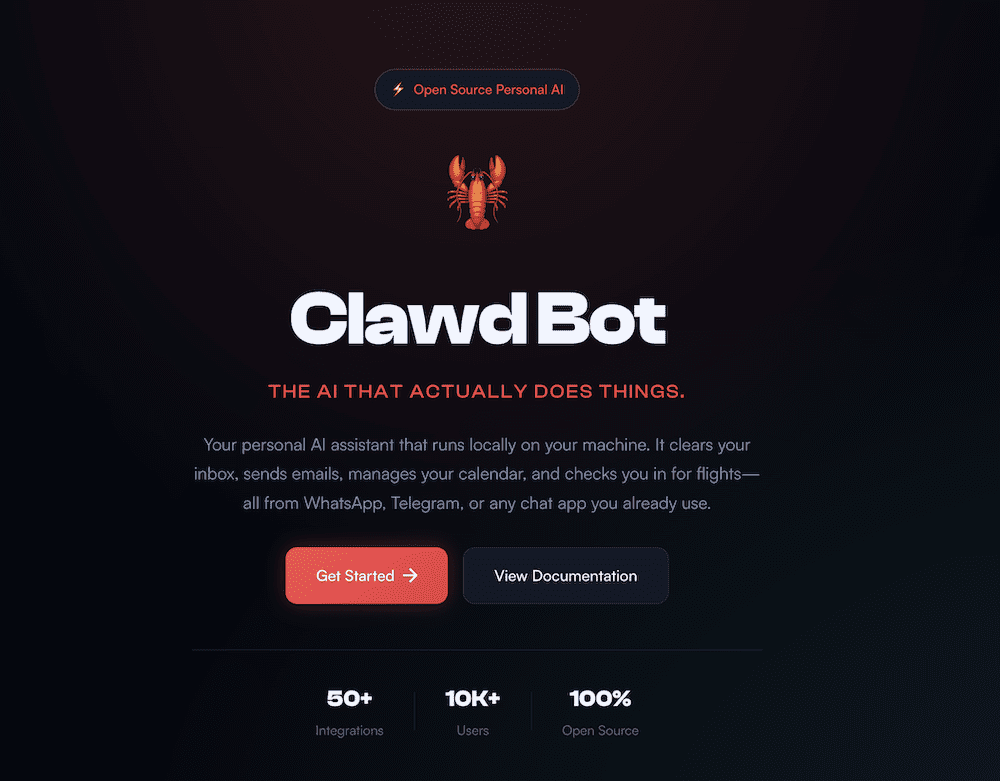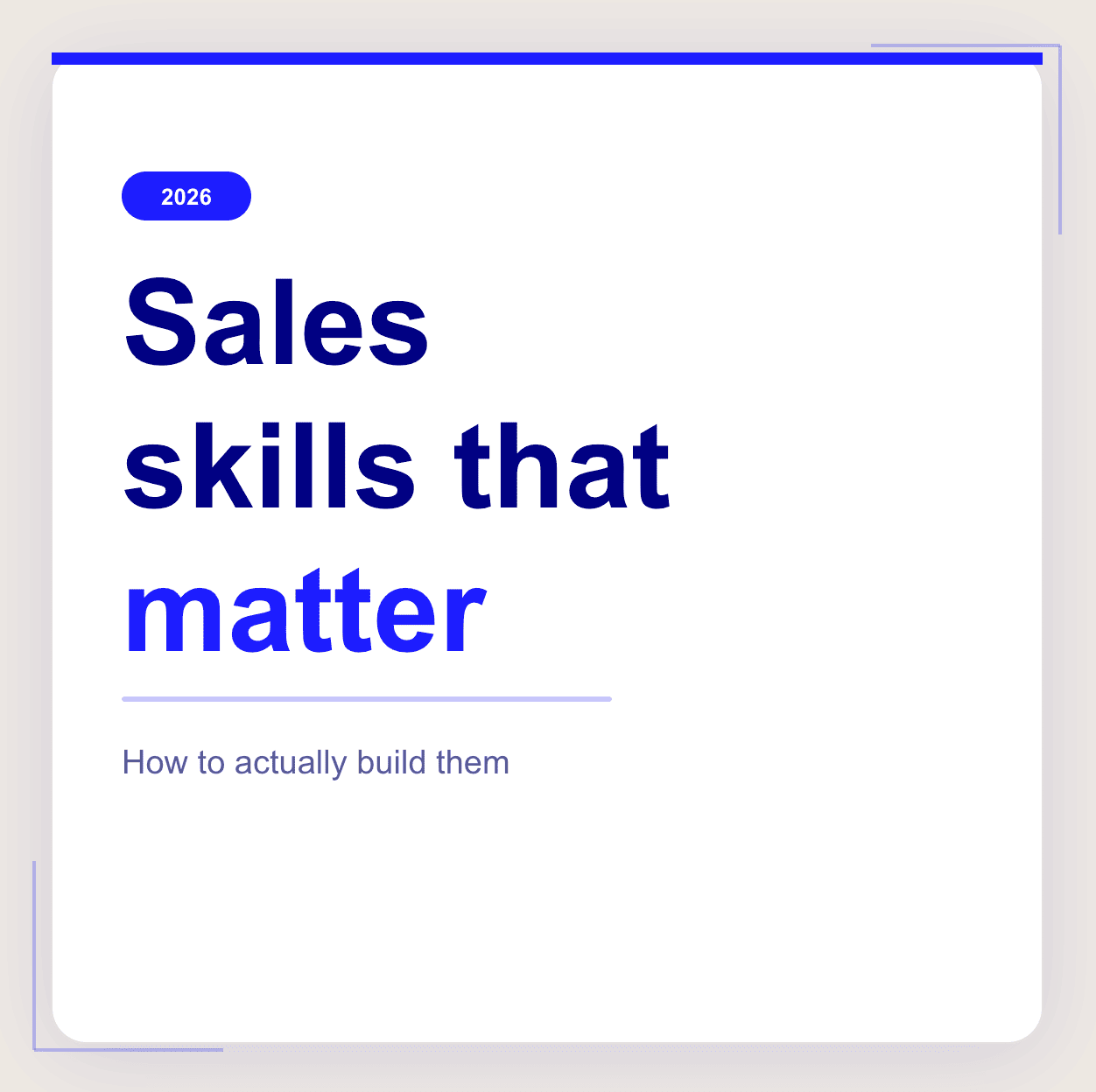When looking at Avoma vs Gong, both tools offer meeting insights, but they serve different functions. While they share some similar features, their strengths lie in different areas:
- Gong is built for sales conversation analysis, using AI to track deal progress, highlight trends, and improve forecasting. It helps teams understand what’s working in sales calls and where adjustments are needed.
- Avoma focuses on meeting organization and collaboration, offering automated transcription, structured notes, and summaries to make meetings more productive. It ensures important discussions are captured and shared efficiently.
Rather than being direct competitors, the Gong vs Avoma debate is more about which tool aligns with your team’s needs. Gong helps sales leaders track performance and deal activity, while Avoma improves meeting efficiency and knowledge sharing.
In this Avoma vs Gong breakdown, we’ll compare their features, integrations, and best use cases. By the end, you’ll know whether one of them fits your workflow better or if they work best together.
tl;dr – Avoma or Gong
| Avoma | Gong | |
|---|---|---|
| Transcription | 15 | 26 🟢 |
| Recording | 14 | 18 🟢 |
| Conversational Intelligence | 14 | 16 🟢 |
| Automation & Integrations | 8 | 10 🟢 |
| Note-taking | 12 | 14 🟢 |
| Security | 9 🟢 | 8 |
| Coaching | 8 | 8 |
| Admin | 4 | 4 |
| Organizational | 12 | 12 |
| Support | 2 | 2 |
| Revenue Intelligence | 4 | 4 |
| Other | 6 | 6 |
| Total | 116 | 128 🟢 |
Gong takes the lead with 128 points compared to Avoma’s 116, outperforming in transcription, conversation analysis, automation, and note-taking. It’s built for sales teams that need AI-driven insights, deal tracking, and revenue forecasting.
Avoma remains a solid option, especially for teams that focus on structured meeting management, AI-powered notes, and collaboration. It provides automated summaries, CRM syncing, and conversation insights but in a lighter, more accessible way.
While Gong is optimized for large-scale sales operations with deep analytics and AI-driven forecasting, Avoma is more about meeting organization, structured note automation, and team collaboration.
For teams looking for a lower-cost AI meeting assistant, tl;dv offers a strong alternative, providing real-time transcription, searchable meeting archives, and AI-powered summaries, making it a viable option between Avoma’s structured workflows and Gong’s enterprise-grade analytics.
Avoma vs Gong: 12 Factors to Consider While Choosing the Best AI Notetaker
How do we rank?
- We give 2 points to a platform once it is the clear winner or when the capability is equally met by the other.
- We give 1 point when the capability is present, but it’s not a winner.
- We give 0 points when the capability is not present.
Transcription Capabilities
| Avoma (15) | Gong (26) | |
|---|---|---|
| Transcriptions included | 🟢 | 🟢 Unlimited |
| Real-time transcriptions | 🟢 | 🟢 |
| Languages supported | 🟢 +75 | 🟢 +70 |
| Dialects supported | 🟢 | 🟢 |
| Filler word removal | 🔴 | 🟢 |
| Speaker recognition | 🟢 | 🟢 |
| Speaker names | 🟢 | 🟢 |
| Transcribe video/audio uploads | 🟢 | 🟢 |
| Export transcripts | 🟢 | 🟢 |
| Clips from transcript | 🟢 | 🟢 |
| Custom vocabulary | 🔴 | 🟢 |
| Full-Transcript search | 🟢 | 🟢 |
| Edit transcription | 🟢 | 🟢 |
Transcriptions Included
Both Avoma and Gong offer unlimited transcription as part of their paid plans, ensuring users can transcribe meetings without limitations.
Real-time Transcriptions
Both platforms support live transcription, allowing teams to follow conversations in real-time. This feature is especially useful for coaching and reviewing key moments as they happen, making meetings more actionable.
Languages Supported
Avoma supports over 75 languages, while Gong covers more than 70, making both platforms viable for global teams. They also recognize regional dialects, improving accuracy for speakers with strong accents or localized phrasing.
Filler Word Removal
Gong automatically cleans up transcripts by removing filler words like “um,” “uh,” and “like,” making transcripts more polished and easier to read. Avoma does not have this feature, meaning users will need to manually edit out unnecessary words.
Speaker Recognition
Both platforms can identify different speakers in a conversation, ensuring that dialogue is correctly segmented within transcripts.
Speaker Names
Avoma and Gong allow users to assign names to different speakers within transcripts. Gong can automatically apply assigned names in future transcripts, while Avoma requires manual adjustments per meeting.
Export Transcripts
Users on both platforms can export their transcripts in multiple formats, making it easy to share meeting summaries with team members or external stakeholders.
Clips from Transcript
Both Avoma and Gong let users highlight key sections of transcripts and create video snippets, making it easier to extract key moments for training, coaching, or deal reviews.
Custom Vocabulary
Gong offers a custom vocabulary feature, allowing users to train the AI to recognize industry-specific terms, product names, and technical jargon. Avoma does not currently support this, meaning transcripts may require more manual corrections in specialized industries.
Edit Transcription
Avoma and Gong both allow users to edit transcripts, ensuring accuracy before saving or sharing.
Recording Capabilities
| Avoma (14) | Gong (18) | |
|---|---|---|
| Video platforms | 🟢 Zoom, MS Teams, Google Meet + more | 🟢 Zoom, MS Teams, Google Meet + more |
| Storage | 🟢 Unlimited | 🟢 Unlimited |
| Records video | 🟢 | 🟢 |
| Concurrent meetings | 🔴 | 🔴 |
| Download recordings | 🟢 | 🟢 |
| Capture slides | 🔴 | 🟢 |
| Viewing analytics | 🔴 | 🟢 |
| Integrated Calendar | 🟢 | 🟢 |
| Recording Editing | 🟠 Snippets only | 🟢 |
| Reels | 🟢 | 🟢 |
Video Platforms Supported
Gong integrates with Zoom, Microsoft Teams, Google Meet, Webex, GoToMeeting, RingEx, and more, making it compatible with a wide range of video conferencing platforms. This ensures flexibility for teams using different meeting tools.
Avoma also supports Zoom, Microsoft Teams, Google Meet, Webex, GoToMeeting, BlueJeans, Lifesize, Highfive, and UberConference. While Avoma covers a broad range of platforms, Gong provides a few additional integrations, making it a slightly better fit for companies with diverse conferencing software needs.
Concurrent Meetings
Neither Avoma nor Gong allows a single user account to record multiple meetings simultaneously. To capture concurrent meetings, teams must either purchase additional licenses or use multiple bots.
If your team has a busy call schedule tl;dv offers this as a standard feature, along with many other sales-related functions.
Capture Slides
One of Gong’s features is its ability to capture and save slides separately during presentations. This ensures that key visuals and shared content are preserved independently of the video recording.
Avoma does not provide slide capture as a separate feature. Slides are recorded as part of the overall video but are not saved individually for later reference. If teams want a standalone record of presentation slides, Gong is the better choice.
Viewing Analytics
Gong includes detailed viewer analytics, allowing users to track who viewed a shared recording, when they watched it, and for how long. This data helps sales teams gauge engagement, identifying which sections of a call were most relevant.
Avoma, however, does not offer viewer analytics. Once a recording is shared, there is no built-in way to track engagement metrics, making Gong stronger in this area.
Recording Editing
Gong provides a built-in video editor, allowing users to trim, modify, and refine recordings directly within the platform. This is valuable for sales coaching, training, and content sharing, as teams can remove unnecessary sections or emphasize key moments.
Avoma does not include full video editing tools. Instead, it provides a snippets feature, which allows users to extract key sections from a recording. While useful, this does not replace full editing capabilities. For teams needing a complete editing suite, Gong is the better option.
Reels
Both Avoma and Gong offer a Reels feature, enabling users to highlight key moments from recordings and compile them into short, shareable clips. This is ideal for training, coaching, and internal knowledge sharing.
Conversation Intelligence Capabilities
| Avoma (12) | Gong (16) | |
|---|---|---|
| Single Meeting AI Insights | 🟢 | 🟢 |
| Multi Meeting AI Insights | 🔴 | 🟢 |
| Keyword tracking | 🟢 | 🟢 |
| Sentiment Analysis | 🔴 | 🟢 |
| Key Topic detection | 🟢 | 🟢 |
| Speech Analytics | 🟢 | 🟢 |
| Action item detection | 🟢 | 🟢 |
| Question detection | 🟢 | 🟢 |
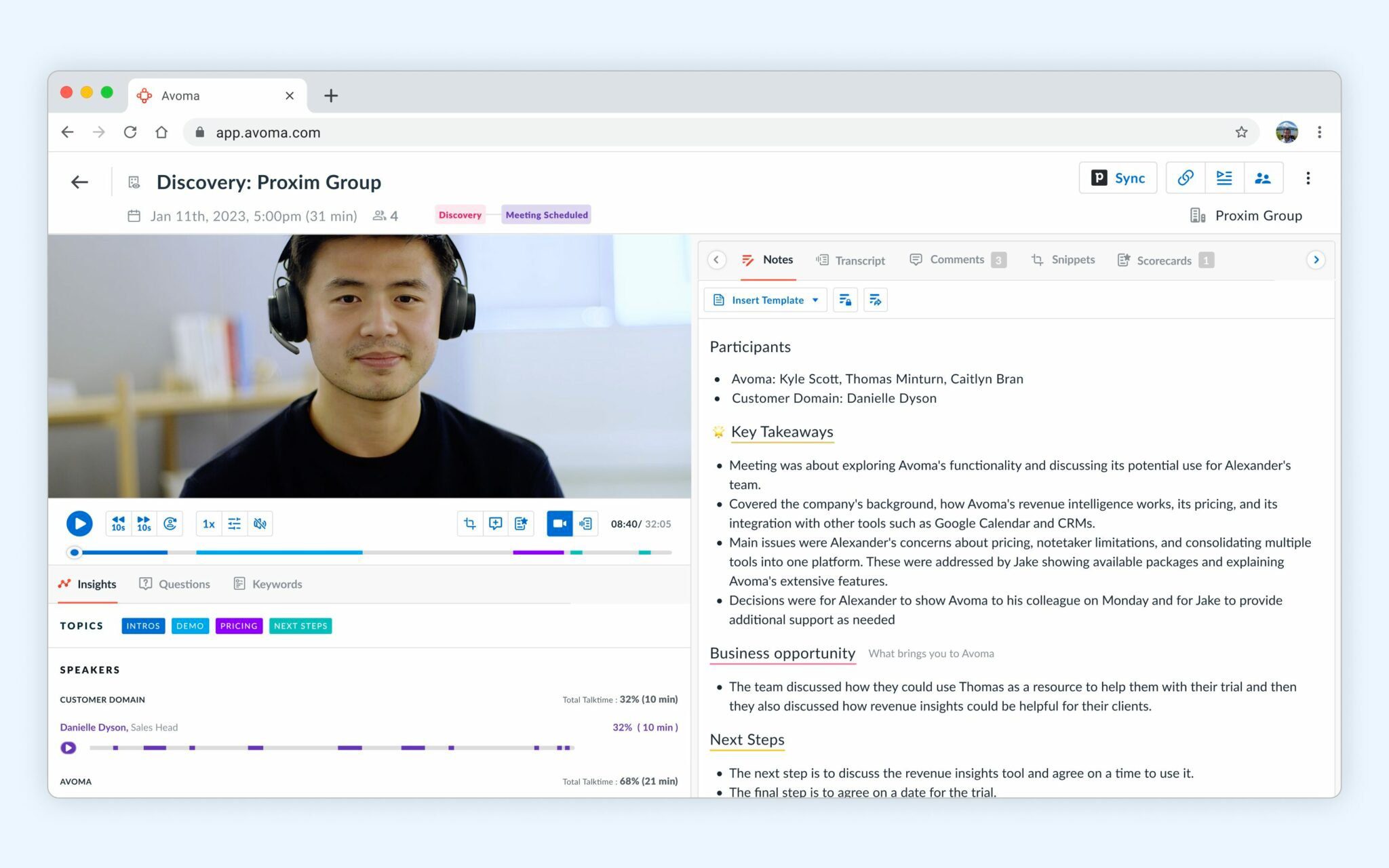
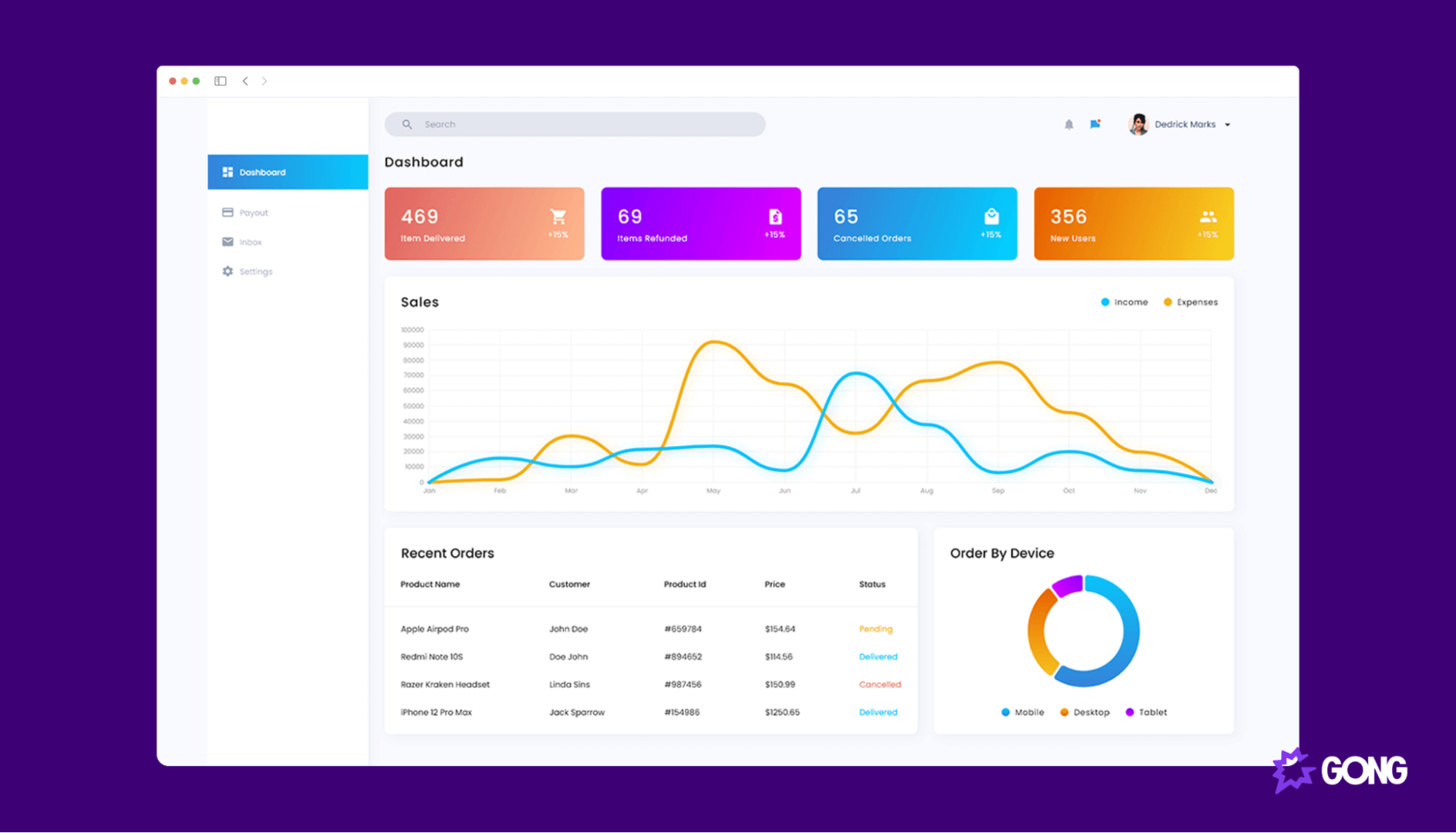

Multi-Meeting AI Insights
Gong provides AI-driven insights across multiple meetings, tracking sales trends, common objections, and overall team performance over time. This feature is especially valuable for sales managers, as it allows for automated reports that summarize insights across all calls.
Avoma does not provide AI-powered multi-meeting insights. Each meeting is analyzed individually, and trends must be manually identified by reviewing multiple conversations.
Keyword Tracking
Both Avoma and Gong include keyword tracking, allowing teams to monitor key phrases such as competitor names, pricing discussions, and customer objections.
Sentiment Analysis
Gong analyzes the emotional tone of conversations, helping teams understand how customers react to different sales pitches. This can be useful for refining sales approaches based on prospect engagement levels.
Avoma does not include sentiment analysis. It focuses on factual meeting insights rather than gauging emotions or tone.
Automation & Integration Capabilities
| Avoma (5) | Gong (10) | |
|---|---|---|
| CRM Integrations | 🟢 | 🟢 |
| Email Integrations | 🔴 | 🟢 |
| Zapier Integrations | 🟢 | 🟢 |
| Post-Meeting summary email | 🟠 Manual | 🟢 |
| Schedule Reports | 🔴 Weekly summary email | 🟢 |
CRM Integrations
Both Avoma and Gong integrate with major CRMs like Salesforce, HubSpot, Pipedrive, Zoho CRM, and Zendesk Sell, ensuring that meeting insights are automatically synced into customer records and sales pipelines.
Zapier Integrations
Both tools support Zapier integrations, allowing users to connect Avoma or Gong with thousands of third-party apps. This is particularly useful for automating workflows, such as:
- Triggering follow-up tasks in project management tools (e.g., Asana, Trello)
- Updating customer records in CRMs when key topics are mentioned
- Sending automated alerts in Slack when specific keywords appear in meetings
Post-Meeting Summary Email
Gong automatically generates and sends post-meeting summaries, providing an AI-driven breakdown of key discussion points, next steps, and follow-ups. This ensures quick and efficient collaboration, allowing teams to act on insights without manually reviewing full transcripts.
Avoma allows users to send summary emails manually, but there is no automated feature. Instead, users must review and approve the content before sending, which adds an extra step to the workflow.
Scheduled Reports
Both Avoma and Gong provide scheduled reporting, delivering regular performance summaries that help sales teams keep track of key trends, coaching opportunities, and overall activity. These reports offer a structured way to monitor progress without the need for manual data extraction. While both platforms support automated insights, Gong has an edge in this area due to its ability to analyze multiple meetings collectively, allowing teams to spot patterns across conversations rather than evaluating each call individually. This broader analytical scope makes Gong particularly useful for managers overseeing larger sales teams or tracking deal progress over time.
Note-taking Capabilities
| Avoma (10) | Gong (14) | |
|---|---|---|
| AI Notes | 🟢 | 🟢 |
| Manual notes during calls | 🟢 | 🟢 |
| Tag people in notes | 🟢 | 🟢 |
| Assign tasks | 🔴 | 🟢 |
| AI Tags / Bookmarks | 🟢 | 🟢 |
| Comments | 🟢 | 🟢 |
| Custom Meeting Templates | 🔴 | 🟢 |
Tag People in Notes
Avoma and Gong both allow users to tag team members within meeting notes, making it easier to highlight important insights and direct follow-ups to the right people. This ensures that action items don’t get lost and that relevant stakeholders are immediately notified about key takeaways. The ability to tag colleagues within notes streamlines collaboration and keeps meeting discussions connected to the right team members.
Assign Tasks
Gong allows users to assign tasks directly within meeting notes, ensuring that follow-ups and action items are clearly documented and linked to the correct person. This feature helps sales teams track accountability and ensures that important next steps don’t fall through the cracks. Avoma, however, does not include built-in task assignment. While follow-ups can still be recorded manually, there’s no direct way to assign them within the platform. Teams using Avoma may need to rely on external tools or integrations to track follow-up actions.
AI Tags / Bookmarks
Both Avoma and Gong offer AI-powered tagging and bookmarking, automatically identifying key moments in a conversation. This feature allows users to quickly navigate through meeting notes, find critical discussion points, and organize content without having to manually highlight sections. AI-generated tags make it easier to review meetings at a glance, helping teams stay on top of important details.
Custom Meeting Templates
Gong provides customizable meeting templates, allowing teams to create structured note-taking formats tailored to their workflow. This ensures consistency across different meetings and makes it easier to organize insights in a format that’s familiar to the team. Avoma does not offer this feature, meaning users must structure their meeting notes manually. Without predefined templates, teams using Avoma may find it harder to standardize note-taking practices across different types of meetings.
Security Capabilities
| Avoma (10) | Gong (8) | |
|---|---|---|
| Data retention | 🟢 No expiry | 🟢 |
| SOC2 Compliant | 🟢 | 🟢 |
| SAML-based SSO | 🟢 | 🟢 |
| GDPR Compliant | 🟢 | 🟠 Partial |
| EU AI Act Compliant | 🔴 Not stated | 🔴 No due to Sentiment Analysis |
| Uses your data to train AI | 🟠 Yes, potentially | 🟠 Yes, its opt-in |
| Private storage | 🔴 not disclosed | 🔴 not disclosed |
| Anonymized sensitive data sent to LLMs | 🔴 not disclosed | 🔴 not disclosed |
| Meeting data chunking and randomizing | 🔴 not disclosed | 🔴 not disclosed |
| BAA with LLM providers | 🔴 not disclosed | 🔴 not disclosed |
| 0-day data retention policy with vendors | 🔴 not disclosed | 🔴 not disclosed |
Data Retention
Avoma paid plans allow for indefinite data retention, ensuring that meeting recordings and transcripts remain accessible as long as the user maintains an active subscription.
Gong retains meeting data for three years by default, with options to extend data retention indefinitely for paid customers. Both platforms ensure that sales teams can store and reference past meetings without worrying about data being automatically removed.
SOC2 Compliance
Both Avoma and Gong are SOC2 Type II certified, meaning they adhere to industry standards for security, availability, processing integrity, confidentiality, and privacy. Avoma underwent an independent security audit to verify compliance, and Gong follows similar security frameworks to ensure customer data is protected.
SAML-Based SSO
Avoma offers Single Sign-On (SSO) for enterprise customers, allowing organizations to integrate their Okta, Azure AD, or other identity providers for secure user authentication. Gong also supports SAML-based SSO, ensuring that teams can manage user access efficiently while maintaining security best practices.
GDPR Compliance
Avoma is fully GDPR-compliant, providing built-in tools for obtaining user consent before recording, as well as mechanisms for data deletion and access requests. This ensures that companies handling EU-based customer data can meet legal requirements and avoid compliance risks.
Gong is partially GDPR-compliant and follows security best practices but has certain limitations in handling EU customer data. While Gong includes ISO 27701 and ISO 27018 certifications, some of its data processing practices may require additional review for full GDPR alignment.
EU AI Act Compliance
Neither Avoma nor Gong are compliant with the EU AI Act due to their use of AI-driven conversation analysis. The Act places restrictions on certain AI functionalities, including sentiment analysis, which Gong provides. Avoma avoids sentiment analysis but has not explicitly stated compliance with the Act.
If you’re looking for an EU AI Act compliant tool that you can feel confident using with EU-based customers, then tl;dv is a good option.
Uses Your Data to Train AI
Avoma’s privacy policy states that it collects meeting data for service improvement, but it does not explicitly confirm whether this data is used to train AI models. While there is no clear opt-out mechanism, enterprise customers may be able to negotiate additional data handling terms to restrict AI model training on their conversations.
Gong allows customers to opt in or out of AI model training, ensuring that users have control over whether their meeting data contributes to AI improvements and predictive analytics.
Private Storage
Neither Avoma nor Gong offer on-premise or customer-managed storage options. Both platforms store meeting recordings and transcripts in secure, cloud-based environments, with Avoma using AWS data centers in the USA. Users cannot configure private storage locations such as their own S3 buckets or on-premises servers.
Anonymized Sensitive Data Sent to LLMs
Avoma integrates with GPT-4 for certain AI-driven features, but it has not disclosed whether sensitive meeting data is anonymized before being sent to large language models (LLMs). Gong has also not provided transparency on this matter, making it unclear whether personally identifiable information (PII) is masked before AI processing.
Meeting Data Chunking & Randomizing
Neither Avoma nor Gong have publicly confirmed whether they break up or randomize meeting data before sending it to AI models. Some AI-powered platforms use data chunking techniques to enhance privacy, but there is no evidence that Avoma or Gong employ these measures.
BAA with LLM Providers
A Business Associate Agreement (BAA) is essential for organizations handling sensitive medical or financial data, ensuring that third-party AI providers comply with HIPAA and other data protection laws. Neither Avoma nor Gong disclose whether they have BAAs with OpenAI or other LLM providers, which means organizations in regulated industries should exercise caution when using these platforms.
0-Day Data Retention Policy with Vendors
When AI models or third-party processors handle meeting data, some companies enforce a zero-day data retention policy, meaning that data is immediately deleted after processing. Avoma and Gong do not provide clarity on whether they enforce this policy with vendors, making it unclear how long external services retain sensitive information.
Coaching Capabilities
| Avoma (8) | Gong (8) | |
|---|---|---|
| Playbooks Scorecards | 🟢 | 🟢 |
| Custom Playbooks | 🟢 | 🟢 |
| Template Playbooks | 🟢 | 🟢 |
| Objection Handling | 🟢 | 🟢 |

Playbooks Scorecards
Avoma and Gong both offer call scorecards, allowing managers to evaluate sales conversations based on predefined criteria. This enables sales leaders to track rep performance in areas such as discovery questioning, objection handling, and deal progression. Avoma also includes AI-powered scoring, which helps automate evaluation by identifying key conversation elements without requiring manual review. Gong provides similar functionality, ensuring that coaching insights are consistently applied across all recorded calls.
Custom Playbooks
Both platforms allow teams to create custom coaching playbooks, ensuring that training and feedback align with specific business needs. Avoma’s customizable playbooks enable sales teams to define unique scoring criteria and coaching frameworks, allowing managers to focus on what matters most in their industry or sales methodology. Gong provides the same level of flexibility, enabling teams to adapt their coaching materials to match company-specific sales processes.
Template Playbooks
For teams looking to implement structured coaching without building everything from scratch, both Avoma and Gong provide pre-built coaching templates. These templates cover common sales methodologies like MEDDIC and SPIN Selling, giving teams a structured approach to evaluating sales calls. Avoma’s templates can be modified to better suit different call types, ensuring they remain relevant across various sales interactions. Gong offers a similar feature, allowing teams to use standardized templates or adapt them to meet their coaching needs.
Objection Handling
Avoma and Gong both support objection tracking and coaching, helping sales reps improve their ability to navigate tough customer concerns. Avoma’s system detects objection-related keywords and phrases in conversations, allowing managers to review how reps handled challenges and provide targeted feedback. Gong offers a similar feature, surfacing customer objections in real-time and post-call analysis to help sales teams refine their messaging. Both platforms allow managers to pinpoint moments where deals may have been at risk and offer coaching on how to respond more effectively.
Admin Capabilities
| Avoma (4) | Gong (4) | |
|---|---|---|
| Apply auto-record of all meetings in the team members’ calendar | 🟢 | 🟢 |
| Apply auto-share of meetings recorded by team members | 🟢 | 🟢 |
| Prevent Deletion | 🔴 | 🔴 |
| Admin rights over all recordings | 🔴 | 🔴 |
Apply Auto-Record of All Meetings in the Team Members’ Calendar
Both Avoma and Gong allow automated recording of meetings, ensuring that important conversations are captured without requiring manual intervention.
In Avoma, administrators can set organization-wide recording preferences to automatically capture meetings based on predefined rules. This includes the option to record all external meetings, all internal meetings, or a mix of both. By integrating with Google Calendar and Outlook, Avoma detects scheduled meetings and joins them automatically. While users have the ability to control their personal recording settings, admins can enforce organization-wide preferences to ensure that key meetings are documented.
Gong provides similar functionality, allowing companies to configure default recording settings that automatically capture scheduled calls across teams. This feature helps maintain consistent record-keeping and compliance without requiring reps to start recordings manually.
Apply Auto-Share of Meetings Recorded by Team Members
Both Avoma and Gong offer automated sharing of recorded meetings, ensuring that sales teams, managers, and other stakeholders have access to relevant conversations without requiring manual intervention.
Avoma allows administrators to define granular sharing rules, ensuring that recorded meetings are automatically distributed to the appropriate teams or individuals. By default, recordings can be shared across an organization or restricted to specific teams, ensuring that internal discussions remain accessible while maintaining control over external meetings. Admins can enforce policies that automatically share recordings with relevant departments, streamlining collaboration and making it easier for teams to access critical information.
Gong follows a similar approach, providing automatic sharing settings that ensure recorded meetings are available to key stakeholders. Like Avoma, it enables administrators to configure who can access recordings by default, ensuring that no important conversations are missed.
Prevent Deletion
Neither Avoma nor Gong allows administrators to prevent users from deleting their own recordings. This means that once a meeting is recorded, the user who initiated the recording has the ability to delete it at their discretion.
In Avoma, there is no built-in setting to restrict deletion rights, meaning that users can remove recordings from the system without administrator approval. While admins have an overview of shared recordings, they do not have the ability to lock recordings to enforce data retention policies. For organizations with strict compliance requirements, this could be a potential concern.
Gong has a similar limitation—recordings are owned by the user who initiated them, and admins do not have the ability to prevent deletion. If a sales rep or meeting host removes a recording, it cannot be retrieved unless a backup exists. This could create challenges for compliance teams or organizations with regulatory retention requirements.
Admin Rights Over All Recordings
Neither Avoma nor Gong grants administrators full access to all recorded meetings.
In Avoma, admin visibility is limited to meetings that have been shared at the team or organization level. If a user marks a meeting as private, administrators cannot override privacy settings to gain access. While this ensures that confidential one-on-one or external calls remain protected, it also limits administrative oversight for organizations that require universal access to all recorded conversations.
Gong follows a similar model, where admins can configure access controls, but they do not have unrestricted access to all meetings by default. Permissions are assigned based on user-defined roles, and if a recording is set to private, admins cannot access its contents unless they have been explicitly granted permission.
Organizational Capabilities
| Avoma (12) | Gong (12) | |
|---|---|---|
| Team Workspaces | 🟢 | 🟢 |
| Meetings Library | 🟢 | 🟢 |
| Smart Filters | 🟢 | 🟢 |
| Global Search | 🟢 | 🟢 |
| Search within meetings | 🟢 | 🟢 |
| Folders | 🟢 | 🟢 |
Team Workspaces
Both Avoma and Gong provide team workspaces, allowing organizations to structure access to recordings and meeting insights based on departments, teams, or roles.
In Avoma, users can create dedicated teams, such as Sales, Customer Success, or Product, ensuring that meeting recordings and insights are organized and accessible only to relevant team members. Admins can assign permissions to specific teams, ensuring that sensitive conversations remain within the appropriate department. Analytics and reporting can also be filtered by team, making it easier to track performance at a department level.
Gong offers similar functionality, providing a central hub where teams can access, review, and collaborate on sales calls. Meetings and insights are categorized by team, ensuring that each department can efficiently locate and analyze relevant conversations.
Meetings Library
Avoma and Gong both provide a centralized meetings library, allowing users to store, search, and retrieve past calls for reference, training, and performance tracking.
Avoma’s Meetings Library serves as an organization-wide repository where all recorded calls and meeting notes are stored. Users can search and retrieve past conversations, ensuring that valuable insights from customer interactions remain accessible. Additionally, Avoma includes Playlists, which allow users to curate sets of meetings or key moments, making it easy to create a training resource or review calls grouped by themes, such as product demos or negotiation discussions.
Gong’s Meeting Library provides similar storage and search capabilities, ensuring that teams can quickly access past calls for review and coaching purposes. Gong’s searchable archive makes it easy to retrieve key insights from past sales conversations.
Smart Filters
Both platforms provide advanced filtering capabilities, allowing users to find specific meetings based on various criteria.
Avoma offers extensive filtering options, enabling users to filter calls by date, participant, team, call type, and even keywords tracked within conversations. For example, a manager can filter all “Demo” meetings where a specific competitor was mentioned, allowing for targeted analysis. Avoma’s UI supports saved filters and views, making it easier to navigate large volumes of meetings over time.
Gong provides a similar filtering experience, enabling users to search through recorded meetings based on keywords, participants, call type, and topics. These filters ensure that teams can quickly locate specific interactions without manually scrolling through hundreds of recordings.
Global Search
Avoma and Gong both offer global search functionality, enabling users to search across all recorded meetings, transcripts, and notes within their organization.
Avoma’s Global Search treats the entire meeting database as searchable text, allowing users to find discussions on specific topics, locate important customer mentions, or pull up calls related to a particular deal or project. If a user searches for “contract renewal,” Avoma will return all meetings where that term was mentioned, along with the relevant transcripts and notes.
Gong offers a similarly powerful search function, making it easy to retrieve information from past sales calls and identify recurring themes. Sales managers can search for key deal-related phrases to track how often certain objections arise, or how competitors are being discussed in calls.
Search Within Meetings
Both Avoma and Gong allow users to search within individual meetings, making it easy to jump to specific points within a transcript.
Avoma’s in-meeting search enables users to locate key moments within a conversation, whether it’s a pricing discussion, customer question, or competitor mention. This feature ensures that users don’t have to listen to an entire recording just to find one key moment.
Gong offers a similar search function, allowing users to quickly navigate to specific points in a transcript and focus on the most critical parts of a conversation.
Folders
Avoma and Gong both provide organizational tools to categorize meetings, ensuring that teams can group conversations by topic, project, or team focus.
Avoma uses Playlists and tags as a way to create collections of meetings. Users can group meetings into custom playlists based on themes such as onboarding calls, deal closings, or customer feedback sessions. While Avoma does not use traditional folder structures, its Playlist feature functions similarly, providing a way to organize, save, and share specific sets of meetings with relevant teams.
Gong offers traditional folder-based organization, allowing users to sort meetings into clearly defined categories. This makes it easy to manage and retrieve specific recordings based on deal stage, meeting type, or project focus.
Support Capabilities
| Avoma (2) | Gong (2) | |
|---|---|---|
| Support in Free Plan | 🔴 Not applicable as no free plan | 🔴 Not applicable as no free plan |
| Priority Support | 🟢 | 🟢 |
Support in Free Plan
Neither tool has a truly free plan, Avoma offers a 14 day free trial, but the level of support in this appears to be basic.
Priority Support
Both Avoma and Gong provide priority support for paying customers, ensuring that teams on premium plans receive faster response times and access to direct assistance.
Avoma offers live chat and email support on all paid plans. Higher-tier plans include a dedicated Slack support channel for faster communication. Businesses on lower-tier plans that require a designated Customer Success Manager (CSM) for onboarding, training, and ongoing support must purchase it as an add-on for $2,000 per year. Recurring quarterly training is only included in select plans and is not available across all pricing tiers.
Gong provides priority support for all paid customers, but its documentation does not specify differences in support levels across pricing tiers. While Gong offers customer success resources and training services, it is unclear whether direct support varies based on the plan a company selects.
Revenue Intelligence Capabilities
| Avoma (4) | Gong (4) | |
|---|---|---|
| Forecasting | 🟢 | 🟢 |
| Deal execution | 🟢 | 🟢 |

Forecasting
Both Avoma and Gong provide forecasting tools that help sales teams track pipeline trends and assess deal health.
Avoma’s forecasting system integrates with CRM fields, offering insights into deal stages, risk alerts, and revenue projections. Gong’s forecasting capabilities focus on pipeline analysis, deal momentum tracking, and predictive revenue insights, helping teams prioritize the right opportunities.
Deal Execution
Avoma and Gong both offer deal execution insights, helping teams monitor active deals, flag potential risks, and track next steps.
Avoma provides deal alerts, health scores, and CRM updates based on meeting conversations, ensuring teams stay on top of critical details. Gong takes a data-driven approach, using conversation analysis to highlight deal risks, missing decision-makers, and stalled progress.
Who Is It For?
| Avoma (6) | Gong (6) | |
|---|---|---|
| G2 Rating | 🟠 4.6 | 🟢 4.8 |
| Ease of set up | 🟢 Easy, Quick Setup | 🟠 Harder of the two, requires a lot of technical input and set up |
| Localized platform | 🟠 English only | 🟠 Appears to have around 3 |
| Best suited for whom | 🟢 SMB Sales | 🟢 Large Enterprises |
Avoma is ideal for small to mid-sized businesses looking for an intelligent meeting assistant that streamlines note-taking, coaching, and deal tracking. With a simple setup, automated insights, and CRM integration, it helps teams stay on top of conversations without the complexity of enterprise-grade sales tools. Designed for sales, customer success, and revenue teams, Avoma focuses on making meetings more actionable while ensuring key insights are captured and shared.
Gong, on the other hand, is tailored for large enterprises that require deep conversation intelligence, forecasting, and deal analytics. While the setup process is more involved, Gong delivers AI-driven insights, sales performance tracking, and predictive analytics, making it a powerful tool for companies that want data-backed sales optimization. It also holds a 4.8/5 G2 rating, slightly higher than Avoma’s 4.6/5, indicating strong user satisfaction across both platforms.
For businesses investing in a full-stack sales enablement strategy, Avoma and Gong can complement each other. Avoma enhances meeting productivity, coaching, and CRM efficiency, while Gong provides long-term sales analysis and forecasting. However, for teams looking for a cost-effective AI meeting assistant, a tool like tl;dv may offer a more flexible and budget-friendly AI meeting assistant to Gong’s enterprise-heavy approach, and that fills in some of the gaps that Avoma has.
Verdict: Avoma vs Gong – Which One Is the Best?
| Avoma | Gong | |
|---|---|---|
| Transcription | 15 | 26 🟢 |
| Recording | 14 | 18 🟢 |
| Conversational Intelligence | 14 | 16 🟢 |
| Automation & Integrations | 8 | 10 🟢 |
| Note-taking | 12 | 14 🟢 |
| Security | 9 🟢 | 8 |
| Coaching | 8 | 8 |
| Admin | 4 | 4 |
| Organizational | 12 | 12 |
| Support | 2 | 2 |
| Revenue Intelligence | 4 | 4 |
| Other | 6 | 6 |
| Total | 116 | 128 🟢 |
Gong takes the lead with 128 points compared to Avoma’s 116, excelling in transcription, conversation intelligence, automation, and note-taking. It is built for sales teams that need AI-driven insights, deal tracking, and revenue forecasting.
Avoma remains a strong alternative, especially for teams that focus on structured meeting management, AI-powered notes, and collaboration. It provides automated summaries, CRM syncing, and conversation insights but in a more accessible and cost-effective way.
While Gong is optimized for large-scale sales operations with deep analytics and AI-driven forecasting, Avoma is better suited for teams that prioritize meeting organization, structured note automation, and team collaboration.
For teams looking for a lower-cost AI meeting assistant, tl;dv offers a strong alternative, providing real-time transcription, searchable meeting archives, and AI-powered summaries, making it a viable option between Avoma’s structured workflows and Gong’s enterprise-grade analytics.

